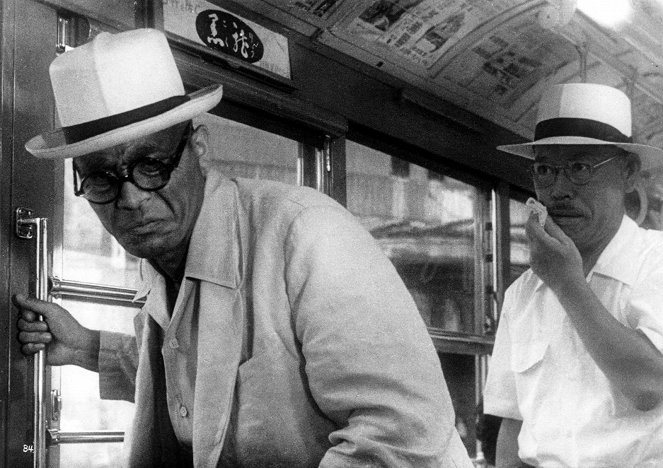Réalisation:
黒澤明Photographie:
Asakazu NakaiMusique:
Masaru SatōActeurs·trices:
Toshirō Mifune, Takashi Shimura, Minoru Chiaki, Reiko Mori, Hiroshi Tachikawa, Kamatari Fujiwara, Atsushi Watanabe, Eijirō Tōno, Yutaka Sada, 三好栄子 (plus)Résumés(1)
Tokyo, 1955. Le chef de famille Kiichi Nakajima dirige une usine avec ses nombreux enfants. Malgré la prospérité de son entreprise, le vieil homme souhaite la vendre. En effet, Nakajima est envahi par la peur d'une nouvelle bombe atomique lâchée sur le Japon et est prêt à toutes les concessions financières pour s'exiler au Brésil avec sa famille. Mais ses enfants ne voient pas cette lubie d'un bon oeil et souhaitent placer leur père sous tutelle... (Carlotta Films)
(plus)Critiques (2)
Authoritative head of the family with seemingly irrational fear of an H-bomb dropping on one hand... And his numerous descendants on the other. Both sides love each other, but when the father decides to sell his business (the only livelihood his family knew) and everybody have to movie to Brazil to find not necessarily complete safety, the family has to step in. This relationship drama about a dysfunctional Japanese family is used as usual by Kurosawa as a social probe and as a (not just) then relevant comment on the impact of the Cold War on regular people, which has unarguable testimonial value especially for Japan. The theme is interesting and the screenplay managed to glean much on many levels and lots points of view on the matter. Despite the good acting performances given by all involved, the whole movie rests mainly on one single role, played by Kurosawa’s favorite actor, the exquisite Toshiro Mifune. Initially, this choice is surprising because Mifune’s makeup makes him look really old at first glance, but as soon as he begins acting, any misgivings fade away fast. So what if he was only thirty-five years old at the time this was filmed. He embraced his role as an old “fool" and played it excellently. I’ve seen lots of young actors playing an old man, but never before so convincingly as this. What others attempt to achieve by overacting and using the usual acting crutches, Mifune does using just expressions. A powerful work that has much to say even today.
()
Kurosawa is, from my perspective, stronger when he returns from the mythical past full of samurais to the present and addresses serious topics that shaped Japan during his time. I Live in Fear is a psychological drama about an entrepreneur who, in the 1950s, is too preoccupied with thoughts of the wartime hardships of World War II, particularly the nuclear explosions in Hiroshima and Nagasaki. The fear of a new war and nuclear weapons becomes an obsession for him to the extent that he starts planning to emigrate to South America. However, his whole family opposes this idea, either because they would lose their successful business or due to cultural barriers and not speaking Spanish. Matters escalate to the point where the family conflict has to be resolved in court, and the family decides to rid themselves of their patriarch by having him admitted to a psychiatric hospital. Well-acted, excellently directed, and above all, it is a film that says something about Japanese society in its era. Overall impression: 80%.
()

